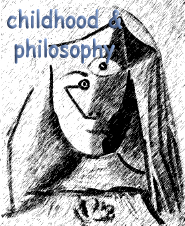educational deontology in the community of philosophical inquiry
DOI:
https://doi.org/10.12957/childphilo.2020.45955Keywords:
children, community of philosophical inquiry, educational deontology, responsibilityAbstract
The paper aims at offering a pedagogical perspective as part of the debate on philosophical practices with children, referring particularly to educational deontology matters emerging when “uncomfortable” questions (but not only) occur. Many of the questions which arise during sessions of philosophical (or sometimes individually, at the end of the session and “out of the community border”) are left unanswered, being perceived as uncomfortable. Our reflection is on what educational deontology requires in order to deal with the challenge that these kinds of questions bring along. Starting from the concept of deontology proposed by the educationalist Mariagrazia Contini and embracing Jana Mohr Lone’s idea of children’s comfort with uncertainty, the paper offers a discussion on what we mean by educational responsibility when undertaking the task of facilitating a community of philosophical inquiry with children. The paper concludes that the facilitator should be present, attentive, capable of good listening. She/he should be a model, a good example for the community: available to listen and answer back, respectful, sensitive, capable of mind shifts and humble. Moreover, a facilitator should be trained to a reflexive thinking: she/he needs to be well aware of her/his cognitive schemes, the premises of her/his knowledge, the social and cultural paradigms she/he refers to. All this “intangible background” needs to be made explicit in order to be aware of the frames that shape each educational action.
Downloads
References
Arendt, Hannah. 1958. The human condition. Chicago: University of Chicago press.
Arendt, Hannah. 2018. Thinking without a banister: essays in understanding, 1953-1975. New York: Schocken.
Banfi, Antonio. 1943. Per un razionalismo critico. Como: Marzorati.
Banfi, Antonio. 1953. La crisi dell'uso dogmatico della ragione. Milano: Bocca.
Bateson, Gregory. 2000 [1972]. Steps to an ecology of mind: collected essays in anthropology, psychiatry, evolution, and epistemology. Chicago, Illinois: University of Chicago Press.
Bertin, Giovanni Maria. 1995. Educazione alla ragione. Lezioni di pedagogia generale. Roma: Armando.
Bertin, Giovanni Maria, Contini, Mariagrazia. 2004. Educazione alla progettualità esistenziale. Roma: Armando editore.
Cavell, Stanley. 1979. The claim of reason: Wittgenstein, skepticism, morality, and tragedy. Oxford: University Press.
Chetty, Darren, Suissa, Judith. 2017. No go areas’: Racism and discomfort in the community of inquiry in Maughn Rollins Gregory, Haynes Joanna, Murris Karin, The Routledge International Handbook of Philosophy for Children. London: Routledge, 11-18.
Clinton, Golding. 2012. “The Teacher as Guide: A conception of the inquiry teacher”. Educational Philosophy and Theory, 45, 1, 91-110.
Contini, Mariagrazia. 2014. L'impegno per una resistenza pedagogica: tra riflessività e deontologia in Contini, Mariagrazia, Demozzi, Silvia, Fabbri, Maurizio, Tolomelli, Alessandro. Deontologia pedagogica. Riflessività e pratiche di resistenza. Milano: Franco Angeli, 13-45.
Dewey, John. 1916. Democracy and Education. An Introduction to the Philosophy of Education. London: Macmillan
Freire, Paolo. 1971. La pedagogia degli oppressi. Milano: Mondadori.
Gregory, Maughn Rollins, Laverty Megan Jane. 2018. In community of inquiry with Ann Margaret Sharp. London: Childhood, philosophy and education, Routledge.
Gregory, Maughn Rollins. 2004. “Practicing democracy: Social intelligence and philosophical practice”. International Journal of Applied Philosophy, 18(2), 163-176.
Gregory, Maughn Rollins. 2007. “Normative dialogue types in philosophy for children”. Gifted Education International, 22(2-3), 160-171.
Gregory, Maughn. 2011. “Philosophy for Children and its Critics: A Mendham Dialogue”. Journal of Philosophy of Education, Vol. 45 (2): 199-219.
Heidegger, Martin. 2010 (1927). Sein und Zeit. Berlin: Oldenbourg Verlag.
Kennedy, David. 2004. “The role of a facilitator in a community of philosophical inquiry”. Metaphilosophy, 35(5), 744-765.
Kizel, A. 2016. “Philosophy with children as an educational platform for self-determined learning”. Cogent Education, 3(1), 1244026.
Kohan, Walter. 2014. Philosophy and Childhood: critical perspectives and affirmative practices. US: Palgrave Macmillan.
Lipman, Matthew. 1967. What Happens in Art. New York: Appleton Century Crofts.
Lipman, Matthew. 1991. Thinking in education. New York: Cambridge University Press.
Lipman, Matthew. 1995. “Moral Education higher-order Thinking and Philosophy for Children”. Amsterdam: Early Child Development and Care, vol. 107, pp.61-70, Overseas Publishers Association.
Lipman, Mattwhes 2008. A Life Teaching Thinking. Montclair, NJ: Institute for the Advancement of Philosophy for Children.
Lone, Jana Mohr. 2011. “Questions and the community of philosophical inquiry”. Childhood & philosophy. 7(13), 75-89.
Michaud, Olivier, Välitalo, Riku. 2017. Authority, democracy and philosophy: the nature and role of authority in a community of philosophical inquiry in Gregory Maughn Rollins, Haynes Joanna, Murris Karin, The Routledge International Handbook of Philosophy for Children. London: Routledge, 27-33.
Murris, Karin. 2000. “The role of the facilitator in philosophical inquiry”. Thinking: The journal of philosophy for children, 15(2), 40-46.
Resnick, Lauren. 1987. Education and Learning to Think. Whashington DC.: National Academy Press.
Rorty, Richard. 1989. Contingency, Irony, and Solidarity. Cambridge: Cambridge University Press.
Sharp, Anne Margareth. 1987. “What is a ‘Community of Inquiry'?”. Journal of Moral Education, 16(1): 37-45.
Sharp, Ann Margareth. 1991. “The community of inquiry: Education for democracy”. Thinking in education, The journal of philosophy for children, 9(2), 31-37.
Splitter, Laurance, & Sharp, Ann Margareth. 1995. “Teaching for better thinking: the classroom community of inquiry”. Australian Council for Educational Research, Ltd., 19 Prospect Hill Rd.
Van Manen, Max. 2016. Pedagogical tact: Knowing what to do when you don’t know what to do. Abingdon-on-Thames: Routledge.
Vansieleghem, Nancy. 2005. “Philosophy for children as the wind of thinking”. Journal of Philosophy of Education, 39(1): 19-35.




